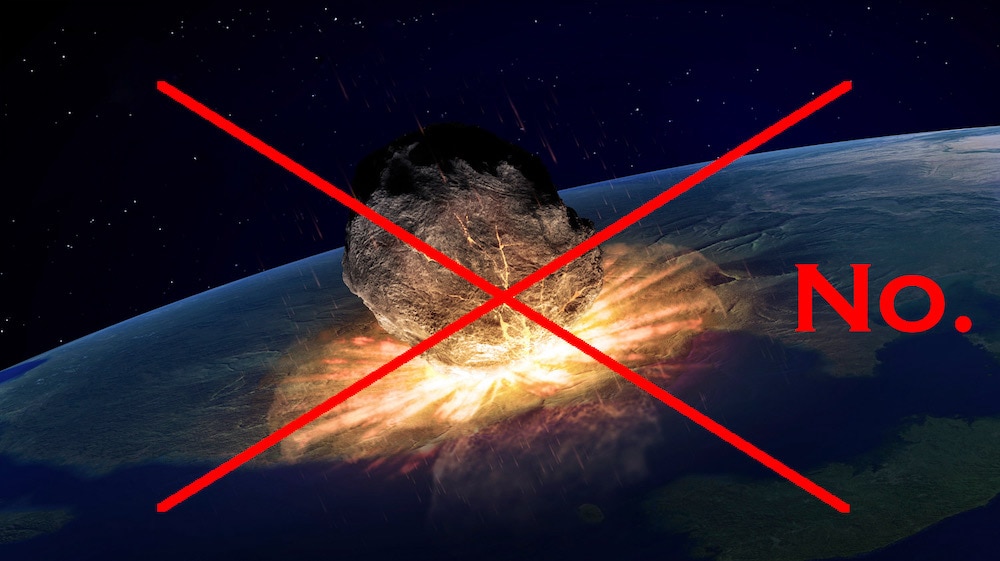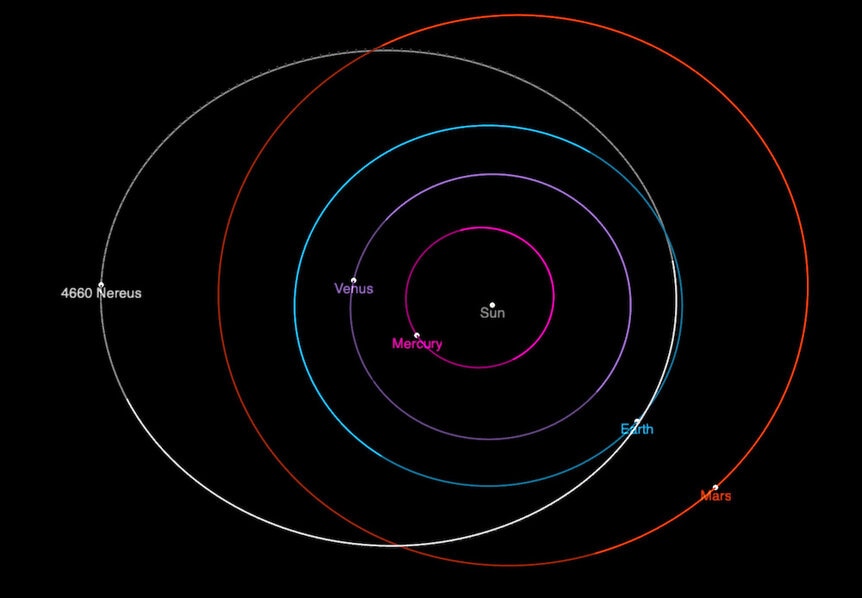Create a free profile to get unlimited access to exclusive videos, sweepstakes, and more!
Another day, another asteroid that won't hit us: Nereus will miss Earth tomorrow
Geez, THIS again?

Over the weekend, an asteroid bigger than the Eiffel Tower will not be impacting the Earth.
I'm sorry to disappoint you.
Mind you, this is not the news you'd see if you've checked social media this week or read any number of fish-wrappery sites that have breathlessly exclaimed that an asteroid "larger than the Eiffel tower" will "break Earth's orbit", whatever that last bit means.
I even saw one TikTokker start off a video saying, "An asteroid might be hitting Earth on December 11." He has six million followers.
I've known about the asteroid for a while, and I really thought that this time, maybe this time, there wouldn't be dozens of media outlets overhyping this misleadingly.
Nope.
Sigh. The image of a rocket launch, which looks a lot to the inexperienced eye like an asteroid burning up in our atmosphere, really drives it home, doesn't it?
OK, here are the facts.
The asteroid 4660 Nereus is something like 300 meters in diameter, so decent-sized. Its orbit takes it from well out past Mars to just inside Earth's orbit. Its orbital inclination — how much it's tilted with respect to Earth's orbit — is only about a degree, so that means it can get close to Earth.
How close? There's a term astronomers use called the minimum orbit intersection distance, or MOID, which is essentially how close the orbits of two objects get. For Earth, the MOID of 4660 Nereus is about 600,000 kilometers. Think of it as the closest Nereus gets to us.
That's close in astronomical terms, but in human terms it's a bit of a hike. It's a little less than twice the distance to the Moon.
But that's as close as it can get. On this particular pass, which will happen on December 11, 2021 at around 14:00 UTC, it will be a much more comfortable 4 million kilometers away. That's a hair more than 10 times farther away than the Moon. Ten times.
In other words, the chance of an impact this weekend is zero. Literally, 0.
What about the future? Well, the NASA/JPL Solar System Dynamics site lists the close approaches for Nereus for the next 176 years. It will get close again many times, but each time it's a clear miss. The closest it'll get over that time is 1.2 million kilometers in 2060.
Does that mean it will never hit us? Well, no. Asteroids are affected by the gravity of the planets, which can subtly change their orbital size and shape over time, and therefore the MOID as well. An asteroid that will miss us now could possibly wind up hitting us some time in the future due to the orbital changes. How well we know this depends on many things, including how long we've been observing the asteroid; the longer a time baseline of observations there are, the better the orbit is understood.
Nereus has a baseline of 40 years — a very long time! — in which over 2,100 observations have been made, so we can be very confident it won't hit us for least a couple of centuries.
However, because it gets closer than 7.5 million kilometers and is bigger than 140 meters wide, NASA categorizes it as a potentially hazardous asteroid, or PHA. This means that someday — in this case, way in the future — its orbit could change enough to put it on an impact trajectory, and should it hit it's big enough to do considerable damage.
However, that day is not today, nor will it be for a long time.
That doesn't stop the disinfo machinery out there. Heck, it doesn't even slow it down.
I was curious about the phrase "break into Earth's orbit" used by several sites. But it's weird. No astronomer would say it like that. We'd say, "crossing Earth's orbit" or, even more accurately, "closest approach will be..." I'm not sure where that phrase was first used — one site posted their article on December 1 as did at least one other, and more venues came later, but in fact many sites use a lot of the same wordage in their article copy. That makes me think they either scraped their content or used the same (misleading) syndicated article.
As for that TikTokker I mentioned, later in his video — after talking about how big and fast Nereus is, and how close it'll get — he finally mentions it'll miss. But I wonder how many of his listeners got that far, and how many really absorbed that fact.
This kind of stuff really ticks me off. First, there are folks out there with cosmophobia — fear of outer space — and they get really scared when they hear misleading stories like these. It's a real phobia that they have a hard time controlling, and this just fans those fires. It's cruel.
Second, it's bad science. At best it's misleading, and at worst it's outright wrong. For criminy sakes, don't we have enough of that already?
It matters. Eroding the public's ability to tell right from wrong, fact from fantasy, has real life consequences. I've been saying this for years, and it's still true: There is a narrow path to reality, and once you step off all manners of nonsense seem equally plausible. If you want proof, why, <gestures in a vaguely pandemic way in every direction>.
It's hard enough maintaining our footing and balance on that path. The last thing we need right now — ever — is clickbait-driven sites giving people a push.



























